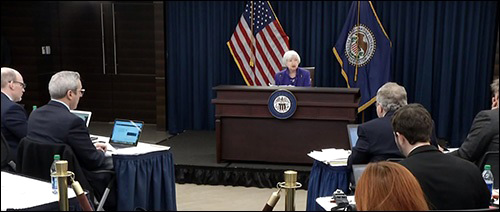By Pam Martens and Russ Martens: December 14, 2017
The outgoing Chair of the Federal Reserve, Janet Yellen, held her last press conference yesterday following the Federal Open Market Committee’s decision to hike the Feds Fund rate by one-quarter percentage point, bringing its target range to 1-1/4 to 1-1/2 percent.
Given the growing reports from market watchers that the stock market has entered the bubble stage and could pose a serious threat to the health of the economy should the bubble burst, CNBC’s Steve Liesman asked Yellen during the press conference if there are “concerns at the Fed about current market valuations.”
Yellen gave a response which may doom her from a respected place in history. She stated:
“So let me start Steve with the stock market generally. Of course the stock market has gone up a great deal this year and we have in recent months characterized the general level of asset valuations as elevated. What that reflects is simply the assessment that looking at price-earnings ratios and comparable metrics for other assets other than equities we see ratios that are in the high end of historical ranges. And so that’s worth pointing out.
“But economists are not great at knowing what appropriate valuations are. We don’t have a terrific record. And the fact that those valuations are high doesn’t mean that they’re necessarily overvalued.
“We are in a – I’ve mentioned this in my opening statement and we’ve talked about this repeatedly – likely a low interest rate environment, lower than we’ve had in past decades. If that turns out to be the case, that’s a factor that supports higher valuations.
“We’re enjoying solid economic growth with low inflation and the risks in the global economy look more balanced than they have in many years.
“So I think what we need to, and are trying to think through, is if there were an adjustment in asset valuations in the stock market, what impact would that have on the economy and would it provoke financial stability concerns.
“And, I think when we look at other indicators of financial stability risks, there’s nothing flashing red there or possibly even orange.
“We have a much more resilient, stronger banking system and we’re not seeing worrisome buildup in leverage or credit growth at excessive levels. So, this is something that the FOMC [Federal Open Market Committee] pays attention to, but if you ask me is this a significant factor shaping monetary policy now, while it’s on the list of risks it’s not a major factor.”
Yellen makes at least one unassailable admission in this statement: her economist predecessors at the Fed certainly “don’t have a terrific record” in calling out bubbles – Alan Greenspan being the worst offender.
After presiding over the worst subprime mortgage and derivatives bubble in history on the belief that Wall Street was fully capable of policing itself, former Fed Chair Alan Greenspan had this to say at a House Oversight Committee hearing on October 23, 2008 after his blunder had helped usher in the greatest financial collapse since the Great Depression:
“So the problem here is something which looked to be a very solid edifice. And, indeed, a critical pillar to market competition and free markets, did break down. And I think that, as I said, shocked me. I still do not fully understand why it happened and, obviously, to the extent that I figure out where it happened and why, I will change my views. If the facts change, I will change.”
In the same hearing, Henry Waxman, the Chair of the Committee, had no problem understanding “why it happened.” It was, plain and simple, regulatory capture. Waxman explained:
“In each case, corporate excess and greed enriched company executives at enormous cost to shareholders and our economy. In each case, these abuses could have been prevented if Federal regulators had paid more attention and intervened with responsible regulations…
“For too long, the prevailing attitude in Washington has been that the market always knows best. The Federal Reserve had the authority to stop the irresponsible lending practices that fueled the subprime mortgage market, but its long-time chairman, Alan Greenspan, rejected pleas that he intervene. The SEC had the authority to insist on tighter standards for credit rating agencies, but it did nothing, despite urging from Congress.
“The Treasury Department could have led the charge for responsible oversight of financial derivatives. Instead, it joined the opposition. The list of regulatory mistakes and misjudgments is long, and the cost to taxpayers and our economy is staggering.
“The SEC relaxed leverage standards on Wall Street, the Offices of Thrift Supervision and the Comptroller of the Currency preempted State efforts to protect home buyers from predatory lending. The Justice Department slashed its efforts to prosecute white-collar fraud.
“Congress is not exempt from responsibility. We passed legislation in 2000 that exempted financial derivatives from regulation, and we took too long, until earlier this year, to pass legislation strengthening oversight of Fannie Mae and Freddie Mac.
“Over and over again, ideology trumped governance. Our regulators became enablers rather than enforcers. Their trust in the wisdom of the markets was infinite. The mantra became government regulation is wrong, the market is infallible.”
How can it be that just a mere nine years since the second greatest financial collapse in U.S. history, the Federal Reserve, the Federal regulator that oversees the largest bank holding companies on Wall Street with a seat on the Financial Stability Oversight Council, has learned nothing about bubbles.


